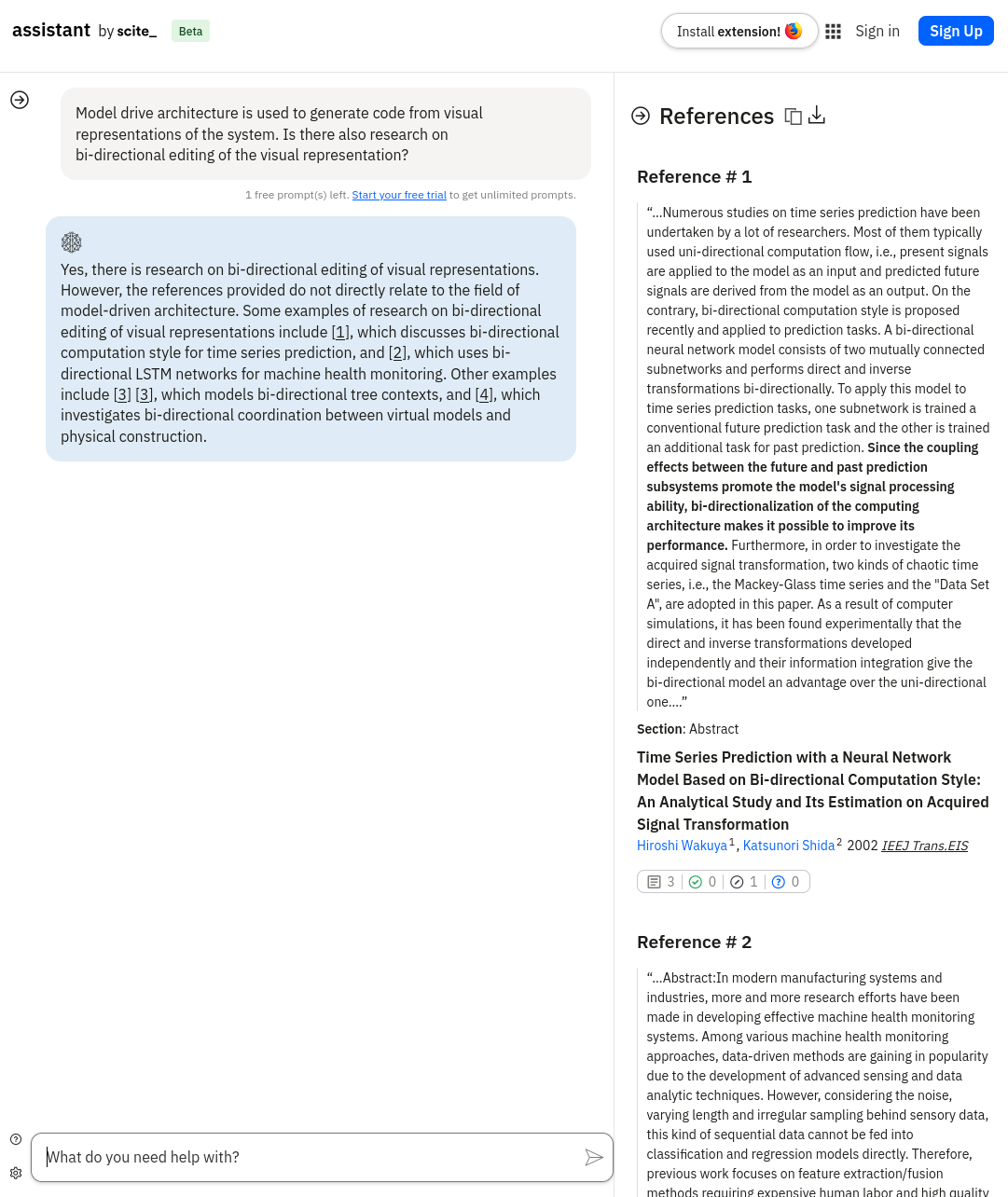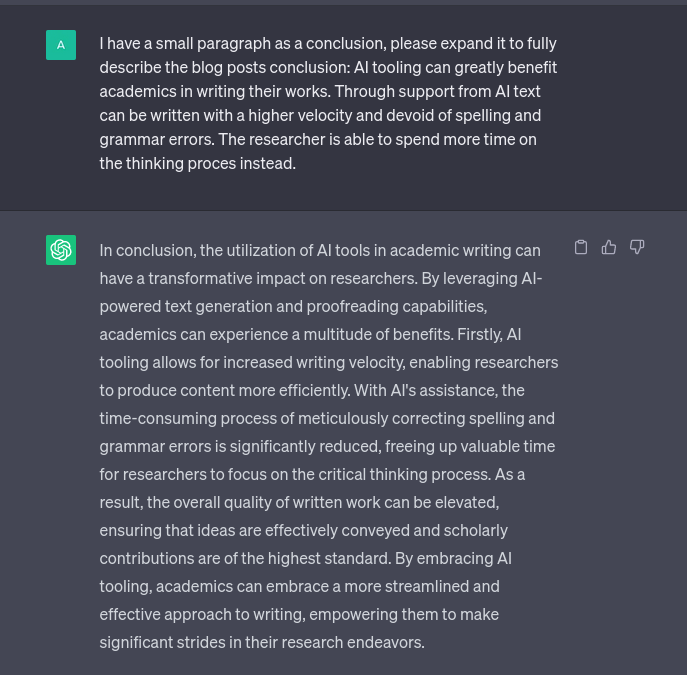Using AI in Academics
Using AI, in particular generative models such as GPT, are in contention within academics. The purity of academics resides in students writing on their research and having their work peer-reviewed. But how can you now be sure that the student wrote the paper and how can you trust its content? Many universities, including the OU have written about it. The OU published an article in Modulair about it. Generally, the consensus seems to be that it is ok to use AI as an assistant, but you must write your texts.
For me AI has proven to be a valuable assistant. Here are some ways in which I found AI to be extremely useful:
Blank page syndrome
“Blank page syndrome” refers to the common experience of feeling stuck and overwhelmed when faced with a blank document. It can hinder productivity and creativity in academic writing. Thankfully, AI-powered tools have been developed to combat this syndrome. Utilizing natural language processing algorithms, these tools can generate ideas, provide content suggestions, and even create outlines to jumpstart the writing process. Examples of such tools include ChatGPT and LLaMA, which have proven to be invaluable resources for overcoming this challenge.
Take the following, simplified, prompt:
I am writing a blog post on using AI to write academic papers. I want to cover “blank page syndrome”, “finding related works” and “spelling and grammar correction”. Your task is to work as my writing assistant. Write an outline for this article.
Results in the following outline:
text code snippet start
I. Introduction
A. Brief explanation of the challenges faced in academic writing
B. Introduction to the role of AI in overcoming these challenges
II. Understanding "Blank Page Syndrome"
A. Definition and common experiences associated with "blank page syndrome"
B. Causes and psychological factors contributing to the syndrome
C. Introduction to AI-powered tools that can help combat it
III. Overcoming "Blank Page Syndrome" with AI
A. AI-based content generation tools
1. Natural language processing algorithms for generating ideas
2. Examples of AI tools that provide content suggestions and outlines
IV. Finding Related Works Efficiently
A. Importance of literature review and related work in academic writing
B. Challenges in finding relevant sources and connections
C. AI-driven approaches to streamline the process
1. Text mining and semantic analysis algorithms
2. Machine learning techniques for identifying related works
D. Examples of AI tools for efficient literature search and recommendation
V. Improving Spelling and Grammar Accuracy
A. Significance of proper spelling and grammar in academic papers
B. Limitations of traditional spell checkers and grammar tools
C. AI-powered proofreading tools for enhanced accuracy
1. Natural language processing algorithms for grammar checks
2. Machine learning models for spelling and punctuation correction
D. Examples of popular AI-based writing assistant tools
VI. Ethical Considerations and Human Oversight
A. Discussing concerns regarding overreliance on AI in writing
B. Importance of human oversight and critical thinking
C. Addressing potential biases and limitations in AI-driven writing tools
VII. Benefits and Impact of AI in Academic Writing
A. Increased productivity and efficiency for researchers
B. Enhanced accuracy and clarity in written work
C. Facilitation of interdisciplinary research and collaboration
VIII. Future Possibilities and Challenges
A. Advancements in AI technologies for academic writing
B. Integration of AI into existing writing platforms and workflows
C. Challenges and considerations for the future of AI in academic writing
IX. Conclusion
A. Recap of the benefits of using AI in academic writing
B. Encouragement for researchers to explore and utilize AI tools
C. Final thoughts on the transformative potential of AI in academic writing
Make sure to expand on each section with relevant examples, case studies, and practical tips to provide a comprehensive understanding of how AI can assist in academic writing.text code snippet end
How is that for a starter outline? Yes, you will have to work on the structure and the ideas, but you get to start with a solid base. It frees you from the initial “get it on paper” anxiety.
Finding related work
Conducting a comprehensive literature review and identifying relevant related works is crucial for academic writing. However, this task can be time-consuming and overwhelming. AI-driven approaches have emerged to streamline the process and provide researchers with efficient ways to discover related works. By leveraging text mining, semantic analysis, and machine learning techniques, AI tools can analyze vast databases of scholarly articles, uncover hidden connections, and recommend relevant sources. Tools like scite_’s Assistant (https://scite.ai/assistant) have proven to be invaluable assets for researchers, enabling them to save time and access a wealth of knowledge with ease.

Improving spelling and grammar accuracy
Accurate spelling and proper grammar are essential in academic writing to effectively convey ideas. While traditional spell checkers and grammar tools have limitations, AI-powered proofreading tools have significantly improved accuracy and efficiency. These tools leverage natural language processing algorithms and machine learning models to identify grammar mistakes, spelling errors, and punctuation inconsistencies. Grammarly, a widely recognized tool, has gained acclaim for its ability to enhance the overall quality of written work, ensuring polished and error-free academic papers.

Ethical Considerations and Human Oversight
While AI tools provide invaluable assistance, it’s important to acknowledge the importance of human oversight and critical thinking in academic writing. Researchers should exercise caution and verify the suggestions provided by AI tools. Additionally, addressing potential biases and limitations in AI-driven writing tools is crucial to ensure fair representation and accurate information.
Benefits and Impact of AI in Academic Writing
The integration of AI into academic writing processes holds tremendous potential. Researchers can benefit from increased productivity, as AI tools expedite tasks that would otherwise be time-consuming. The enhanced accuracy and clarity in written work contribute to improved quality, enabling researchers to convey their ideas more effectively. Moreover, AI-powered tools facilitate interdisciplinary research, knowledge dissemination, and collaboration, breaking down barriers and fostering innovation across academic disciplines.
Future Possibilities and Challenges
The future of AI in academic writing looks promising. Advancements in AI technologies, including more sophisticated natural language processing algorithms and intelligent content generation models, will further enhance the capabilities of AI tools. Integrating AI into existing writing platforms and workflows will streamline the academic writing process, making it more accessible and user-friendly. However, challenges such as addressing
Conclusion
In conclusion, the utilization of AI tools in academic writing can have a transformative impact on researchers. By leveraging AI-powered text generation and proofreading capabilities, academics can experience a multitude of benefits. Firstly, AI tooling allows for increased writing velocity, enabling researchers to produce content more efficiently. With AI’s assistance, the time-consuming process of meticulously correcting spelling and grammar errors is significantly reduced, freeing up valuable time for researchers to focus on the critical thinking process. As a result, the overall quality of written work can be elevated, ensuring that ideas are effectively conveyed and scholarly contributions are of the highest standard. By embracing AI tooling, academics can embrace a more streamlined and effective approach to writing, empowering them to make significant strides in their research endeavors.
